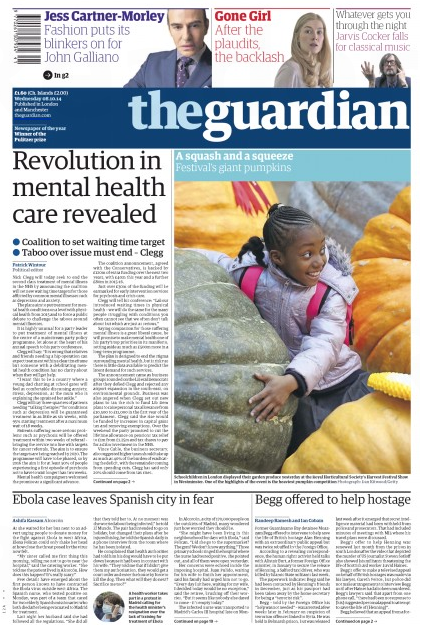Glasgow conference leaves the Lib Dems with only a partial strategy
The use of Nick Clegg’s conference speech today to launch a major new emphasis on mental health, seeking to give mental health parity of esteem with physical health in the NHS, has achieved what many of the Liberal Democrat policy proposals launched over the summer did: positive media coverage for the party.
Indeed, in this case lots of very positive media coverage, including the front page of The Guardian (more details here):

The problem, however, is the one I wrote about at the weekend in The opinion poll crosstabs lie: or why policy isn’t what Lib Dems need to concentrate on:
The apparently super-rationale, evidence-based approach to crafting electoral strategy, deploying segmented mailings fuelled by opinion poll crosstabs with decimals points to work out the best messages to aim at the right people often has it back to front.
Yes, the evidence shows that many people willing to think about voting Liberal Democrat also think the party hasn’t achieved enough in government and hasn’t stopped enough Tory policies. But the answer to their scepticism isn’t to drown them in a factual list of policy achievements (useful though they can be).
That’s because the causation is the other way round. People don’t decide not to vote Lib Dem because they give a bad rating to details of its record. Rather it’s because they’ve decided not to vote Lib Dem that makes them then given a bad rating to details of its record…
The underlying symptom is one of trust and principles.
The party needs to persuade people that being in coalition with another party is consistent with sticking to your principles (it is – because that’s the way you get more of your principles turned into action).
The party also needs to persuade people that cohabiting with another party doesn’t mean liking it. Rather, the party is doing it despite not liking the Conservatives – because that’s the best way to make our country fairer and stronger.
Policy details can help illuminate the answers to that, but they’re the supporting evidence, not the message.
On its own, the mental health policy – good though it is – does not chip away at the reasons people have for not voting Liberal Democrat.
There’s more chipping in another policy, or rather repackaging of existing policies, announced at conference, on tax. This is to raise capital gains tax for the wealthiest in order to pay for the next round of increases in the income tax allowance for millions. Both that tax rise and that tax cut were already agreed Lib Dem policy; pairing them together in Glasgow has given both a neat bit of extra media coverage – and in this case is a policy package that gives a sense of the underlying values and principles of the party.
Anyone can be in favour of better mental health provision – and indeed many people across the political spectrum, including on the right, are. Taxing wealth more and cutting income taxes for millions is more distinctive about the party’s values compared to those of others.
Where does this leave the party as the Glasgow conference comes to an end? With a succession of individually popular messages but without a direct overall strategy to address the underlying issues of trust, values and principles.
By default the party has an answer to that – the national party does the popular national policies and the local candidate doe the trust, values and principles.
Where there is a very well established MP or candidate that can work. Where the party is weaker, that’s a very tall order for the local team to deliver and the party would be wise to address that between now and polling day.
Leave a Reply